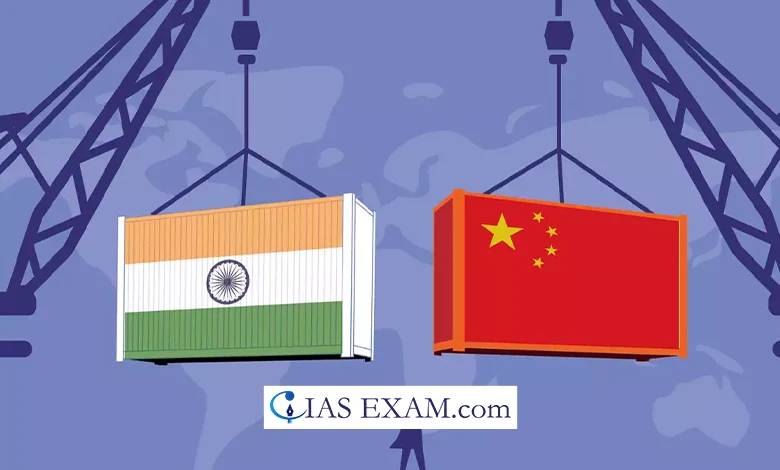
Context
As per a recent report by the Global Trade Research Initiative (GTRI), Goods imports from China have risen 2.3 times faster than India’s total imports over 15 years.
Key Highlights
- India’s imports from China crossed $101 billion in 2023-24 from about $70 billion in 2018-19, and the country’s proportion of India’s industrial goods imports has risen from 21% to 30% over 15 years.
- India’s overall merchandise imports stood at $677.2 billion in 2023-24, of which 15% or $101.8 billion well worth goods have been sourced from China.
- China is the pinnacle provider in 8 fundamental commercial sectors, inclusive of machinery, chemical substances, pharmaceuticals, textiles and many others.
- Trade deficit difficulty: Between 2018-19 and 2023-24, India’s exports to China have stagnated around $16 billion annually while imports have surged, resulting in a cumulative change deficit exceeding $387 billion over six years.
Concerns of India- China Trade Relations
- Trade Imbalance: India imports a long way more goods from China than it exports, leading to a huge trade deficit.
- This trade imbalance has been a chronic issue and has raised concerns about the effect on India’s home industries and employment.
- Quality and Safety of Chinese Goods: There have been issues in India regarding the high-quality and safety of some Chinese goods, mainly in sectors along with electronics and customer products.
- Incidents of substandard or counterfeit merchandise getting into the Indian market have raised regulatory and customer safety concerns.
- Dumping Practices: India has accused China of carrying out dumping practices, wherein Chinese agencies allegedly flood the Indian marketplace with reasonably-priced goods at expenses under manufacturing costs.
- This harms home industries in India by means of undercutting their competitiveness and market share.
- Market Access and Non-Tariff Barriers: Issues such as regulations on foreign funding, complicated approval strategies, and highbrow property rights protection have hindered Indian corporations’ efforts to increase into China.
- Strategic Competition: India and China also are engaged in strategic opposition, both regionally and globally.
- Their development has an effect on South Asia and the Indian Ocean location has caused geopolitical rivalries, which could have an effect on exchange relations.
- Security concerns related to Chinese investments in important infrastructure initiatives in India have also raised alarms.
- India has been careful about allowing Chinese corporations to take part in sensitive sectors along with telecommunications and infrastructure, mentioning nationwide security concerns.
Conclusion
- The strategic implications of the dependency on China are profound and have an effect on not only financial but national security dimensions.
- There is a want for reassessment of India’s import techniques. This is imperative, not the most effective, to mitigate monetary risks, but also to strengthen home industries and reduce dependency on single-country imports.
Source: The Hindu
UPSC Mains Practice Question
Q.“China is using its economic relations and positive trade surplus as tools to develop potential military power status in Asia”. In the light of this statement, discuss its impact on India as her neighbour. (2017)





.png)



